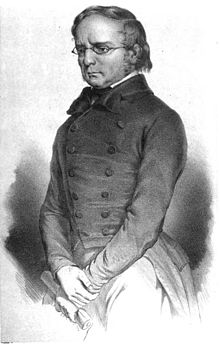Vincenzo Gioberti
| Vincenzo Gioberti | |
|---|---|
 |
|
| 5th Prime Minister of Sardinia | |
|
In office 16 December 1848 – 21 February 1849 |
|
| Monarch | Charles Albert |
| Preceded by | Ettore Perrone di San Martino |
| Succeeded by | Agostino Chiodo |
| Personal details | |
| Born |
April 5, 1801 Turin, Kingdom of Sardinia |
| Died | October 26, 1852 (aged 51) Paris, Second French Empire |
| Nationality | Sardinian |
| Political party | Neo-Guelph |
| Occupation | Priest, philosopher, politician |
| Religion | Roman Catholic |
Vincenzo Gioberti (Italian pronunciation: [vinˈtʃɛntso dʒoˈbɛrti]; 5 April 1801 – 26 October 1852) was an Italian philosopher, publicist and politician.
Gioberti was born in Turin, Italy. When still very young he lost his parents, and at the age of sixteen was admitted among the clerics of the court. He studied theology at the University of Turin, and obtained his doctorate there.
He was educated by the fathers of the Oratory with a view to the priesthood and ordained in 1825. In 1828, he made a journey through Lombardy, and became friendly with Alessandro Manzoni. Partly under the influence of Giuseppe Mazzini, the freedom of Italy became his ruling motive in life, its emancipation, not only from foreign masters, but from modes of thought alien to its genius, and detrimental to its European authority. This authority was in his mind connected with papal supremacy. Though in a way quite intellectual rather than political. This leitmotif informs nearly all his writings, and also his political position with respect to the ruling clerical party—the Jesuits—and the court of Piedmont after the accession of Charles Albert in 1831.
Gioberti was now noticed by the king and made one of his chaplains. His popularity and private influence, however, were reasons enough for the court party to mark him for exile; he was not one of them, and could not be depended on. Knowing this, he resigned his office in 1833, but was suddenly arrested on a charge of conspiracy, and after, an imprisonment of four months was banished without a trial. Gioberti first went to Paris, and a year later, to Brussels where he remained till 1845. In Brussels he taught philosophy and assisted a friend in the work of a private school. He nevertheless found time to write many works of philosophical importance, with special reference to his country and its position.
In 1841, on the appearance of his book "Del Buono", the Grand Duke of Tuscany offered him a chair at the University of Pisa, but King Charles Albert objected, and the offer came to nothing. His fame in Italy dates from 1843 when he published his "Del primato morale e civile degli Italiani", which he dedicated to Silvio Pellico. Starting with the greatness of ancient Rome he traced history down through the splendors of the papacy, and recounting all that science and art owed to the genius of Italy, he declared that the Italian people were a model for all nations, and that their then insignificance was the result of their weakness politically, to remedy which he proposed a confederation of all the states of Italy with the pope as their head.
...
Wikipedia
